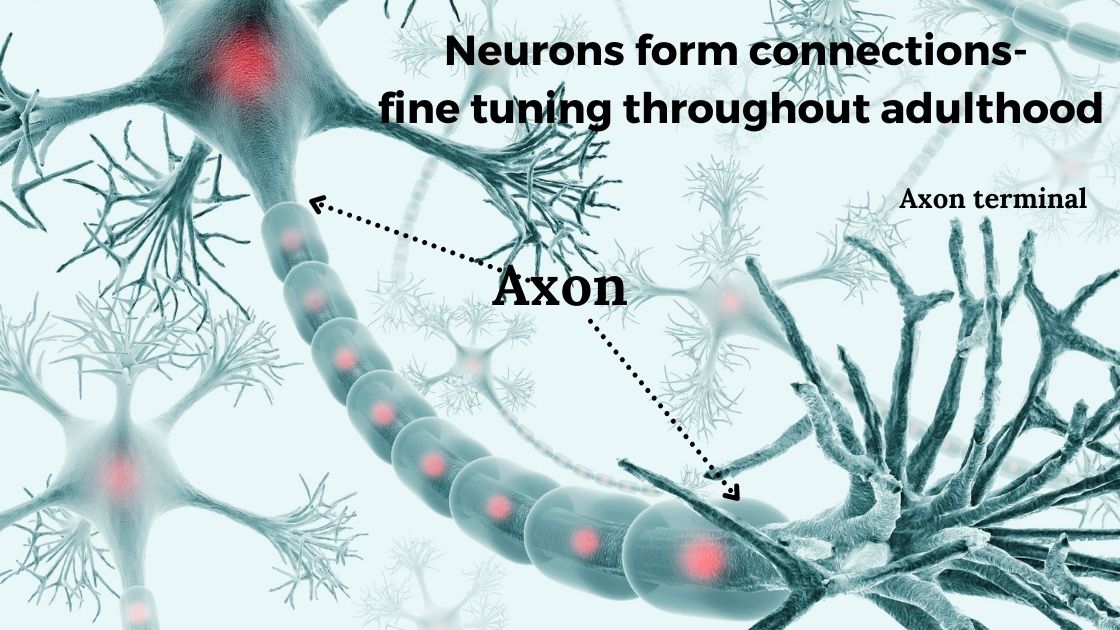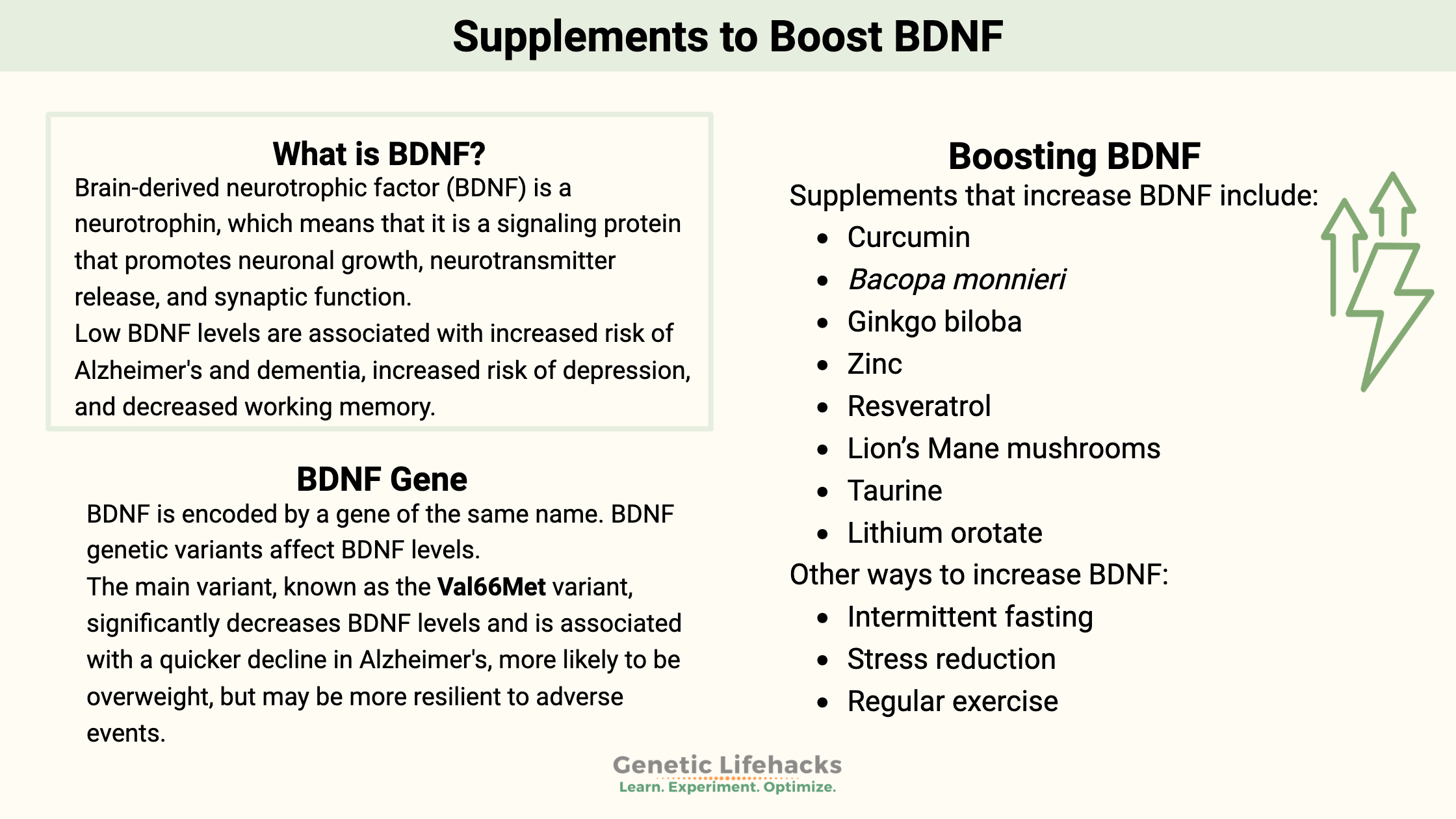Key takeaways:
~BNDF helps the brain work better and repair connections.
~ Low BDNF is linked to depression, brain fog, introversion, and weight gain.
~ Several natural supplements have been shown in research studies to increase BDNF.
~ Simple lifestyle changes can also help to boost BDNF.
What is BDNF (brain-derived neurotrophic factor)?
BDNF is a neurotrophin, which means that it is a signaling protein that promotes neuronal growth, neurotransmitter release, and synaptic function.[ref]
Your brain has billions of neurons, which send signals via electrical impulses along axons or by releasing chemical signals via synapses. Our brains are continually making new connections and getting rid of old, non-useful connections. 
This forming of new connections and paring down unused connections is part of neuronal plasticity.[ref]
BDNF is important in neuronal plasticity — both in neurogenesis (formation of new neurons) and in eliminating inactive neurons.[ref]
Going deeper into the science here…
BDNF initially forms as a precursor called proBDNF. It then modifies into a mature form (mBDNF) or left as the unprocessed proBDNF and transported and released.
The two different forms of BDNF, mBDNF or proBDNF, do pretty much opposite functions:
- When proBDNF releases, it promotes apoptosis (cell death) and synaptic weakening. The proBNDF acts to prune unused neurons.
- Mature BDNF, on the other hand, is promoting cell survival and neuronal connections.[ref]
- Both processes are needed in learning, memory, and cognitive function.
It’s pretty cool how one molecule, BDNF, can do two different functions depending on post-translational modifications.
If you are wondering what causes proBDNF to become mBDNF, it is a proteolytic enzyme called plasmin. This is the same enzyme that degrades fibrin in blood clots. Blocking fibrin with α2-antiplasmin can change the amount of formed mBDFN. While mBDFN is vital for memory processes, blocking the conversion of proBDNF to mBDNF prevents ‘social defeat’ and social avoidance (animal study).[ref]
BDNF Genotype Report:
BDNF is encoded by a gene of the same name. People have different BDNF genetic variants that can make them more or less likely to have low BDNF levels.
The main variant, known as the Val66Met variant, significantly decreases BDNF levels. You can check it in your genetic raw data.
Members:Log in and select your data file Not a member? Join now.
Check your genetic data for rs6265 Val66Met (23andMe v4, v5; AncestryDNA):
- T/T: decreased BDNF[ref] referred to in studies as Met/Met; introversion, resilient to adverse events, a quicker decline in Alz., more likely to be overweight[ref][ref][ref]
- C/T: somewhat decreased BDNF, referred to as Val/Met; introversion, resilient to adverse events, a quicker decline in Alz
- C/C: typical BDNF, referred to as Val/Val
Members: Your genotype for rs6265 is —.
Research on the benefits of boosting BDNF?
- Alzheimer’s and dementia patients have lower BDNF levels.
- Decreasing depression
- Increasing working memory
Preventing dementia:
One sad fact of life is that there are currently no real treatments for Alzheimer’s and other forms of dementia. Therefore, prevention is the only real option. Low BDNF is found in people with cognitive impairment in aging and in Alzheimer’s disease. BDNF is thought to play a protective role in preventing neurodegeneration.[ref][ref]
Depression and BDNF:
While BDNF isn’t like an instantaneous happy pill, increasing BDNF can help people diagnosed with mood disorders. For some people, research shows that low BDNF is a contributing factor for depression and anxiety disorders. Thus, increasing BDNF is a viable treatment approach for some depression, bipolar, or anxiety patients.[ref][ref][ref] In fact, a couple of antidepressant medications do increase BDNF.[ref]
Increasing memory:
BDNF plays a vital role in creating and storing memories. Lower levels of BDNF may play a role in decreased cognitive function – aka brain fog.[ref]
What are the 8 best supplements for increasing BDNF levels?
The rest of this article is for Genetic Lifehacks members only. Consider joining today to see the supplements, lifestyle changes, and epigenetics information.
Conclusion:
Lifestyle factors, aging, and genetics can all affect your BDNF levels. But keeping BDNF at an optimal level is necessary both for your current mental health and for preventing cognitive decline in aging.
If you are concerned about BDNF, make a plan to incorporate several of the options above. For example, include both lifestyle changes – reducing sugar, getting out in the sun – and a supplement to boost low BDNF.
Related Articles and Genes:
BDNF variants: introversion, stress resilience, cognition, and depression
Essentially, BDNF is important for good cognition and nervous system function. You want plenty of BDNF to help your neurotransmitters function well.(Member’s article)
The Interaction Between BDNF and Serotonin
A brain imaging study recently showed that the combination of a BDNF genetic variant plus a serotonin receptor variant literally changes the brain. Instead of just looking at a single genetic variant, this article digs into how the combination of these two variants interact to increase the risk of depression, anxiety, and bipolar disorder.
Hacking BDNF for weight loss
Brain-derived neurotrophic factor (BDNF) is a fascinating growth hormone that performs many functions in our brain. Its involvement helps to support neurons and neuronal growth. In addition, it plays a role in long-term memory — and it also is important in obesity.
Genetics on Reddit
Best places to learn more about current genetics research and 23andMe on Reddit

